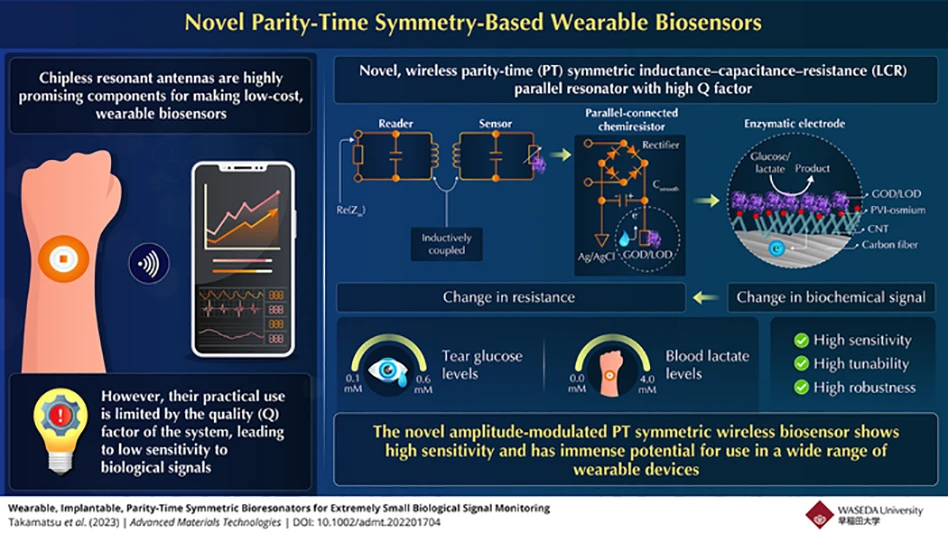
Professor Takeo Miyake from Waseda University
Wireless wearable biosensors have been a game changer in personalized health monitoring and healthcare digitization because they can efficiently detect, record, and monitor medically significant biological signals. Chipless resonant antennae are highly promising components of wearable biosensors, as they are affordable and tractable. However, their practical applications are limited by low sensitivity (inability to detect small biological signals) caused by low quality (Q) factor of the system.
To overcome this hurdle, researchers led by Professor Takeo Miyake from Waseda University, Professor Yin Sijie from Beijing Institute of Technology, and Taiki Takamatsu from Japan Aerospace Exploration Agency, have developed a wireless bioresonator using "parity–time (PT) symmetry" that can detect minute biological signals. Their work has been published in Advanced Materials Technologies.
In this study, the researchers designed a bioresonator consisting of a magnetically coupled reader and sensor with high Q factor, and thus, increased sensitivity to biochemical changes. The reader and sensor both comprise an inductor (L) and capacitor (C) that are parallel-connected to a resistor (R). In the sensor, the resistor is a chemical sensor called a "chemiresistor" that converts biochemical signals into changes in resistance. The chemiresistor contains an enzymatic electrode with an immobilized enzyme. Minute biochemical changes at the enzymatic electrode (in response to changes in the levels of biomolecules such as blood sugar or lactate) are thus converted into electrical signals by the sensor, and then amplified at the reader.
Explaining the technical concept behind their novel biosensor, Miyake says, "We modeled the characteristics of the PT-symmetric wireless sensing system by using an eigenvalue solution and input impedance, and experimentally demonstrated the sensitivity enhancement at/near the exceptional point by using parallel inductance–capacitance–resistance (LCR) resonators. The developed amplitude modulation-based PT-symmetric bioresonator can detect small biological signals that have been difficult to measure wirelessly until now. Moreover, our PT-symmetric system provides two types of readout modes: threshold-based switching and enhanced linear detection. Different readout modes can be used for different sensing ranges."
The researchers tested the system (here containing a glucose-specific enzyme) on human tear fluids and found that it could detect glucose concentrations ranging from 0.1 to 0.6 mM. They also tested it with a lactate-specific enzyme and commercially available human skin and found that it could measure lactate levels in the range of 0.0 to 4.0 mM through human skin tissue, without any loss of sensitivity. This result further indicates that the biosensor can be used as an implantable device. Compared to a conventional chipless resonant antenna-based system, the PT-symmetric system achieved a 2000-fold higher sensitivity in linear and a 78% relative change in threshold-based detection respectively.
Sharing his vision for the future, Miyake concludes, "The present telemetry system is robust and tunable. It can enhance the sensitivity of sensors to small biological signals. We envision that this technology can be used for developing smart contact lenses to detect tear glucose and/or implantable medical devices to detect lactate for efficient monitoring of diabetes and blood poisoning."
This novel PT-symmetric wireless wearable bioresonator may soon usher in a new era of personalized health monitoring and efficient digitized healthcare systems!
Latest from Today's Medical Developments
- Arcline to sell Medical Manufacturing Technologies to Perimeter Solutions
- Decline in German machine tool orders bottoming out
- Analysis, trends, and forecasts for the future of additive manufacturing
- BlueForge Alliance Webinar Series Part III: Integrate Nationally, Catalyze Locally
- Robot orders accelerate in Q3
- Pro Shrink TubeChiller makes shrink-fit tool holding safer, easier
- Revolutionizing biocompatibility: The role of amnion in next-generation medical devices
- #56 Lunch + Learn Podcast with Techman Robot + AMET Inc.





